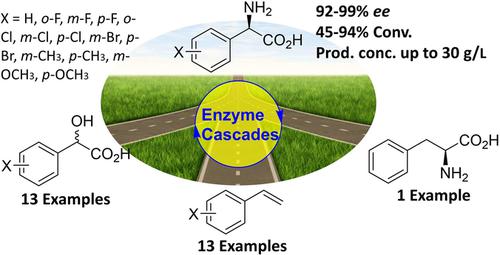当前位置:
X-MOL 学术
›
Adv. Synth. Catal.
›
论文详情
Our official English website, www.x-mol.net, welcomes your
feedback! (Note: you will need to create a separate account there.)
One-Pot Enantioselective Synthesis of d-Phenylglycines from Racemic Mandelic Acids, Styrenes, or Biobased l-Phenylalanine via Cascade Biocatalysis
Advanced Synthesis & Catalysis ( IF 4.4 ) Pub Date : 2017-11-14 12:51:46 , DOI: 10.1002/adsc.201700956 Yi Zhou 1 , Shuke Wu 1, 2 , Zhi Li 1, 2
Advanced Synthesis & Catalysis ( IF 4.4 ) Pub Date : 2017-11-14 12:51:46 , DOI: 10.1002/adsc.201700956 Yi Zhou 1 , Shuke Wu 1, 2 , Zhi Li 1, 2
Affiliation

|
Enantiopure d-phenylglycine and its derivatives are an important group of chiral amino acids with broad applications in thepharmaceutical industry. However, the existing synthetic methods for d-phenylglycine mainly rely on toxic cyanide chemistry and multistep processes. To provide green and safe alternatives, we envisaged cascade biocatalysis for the one-pot synthesis of d-phenylglycine from racemic mandelic acid, styrene, and biobased l-phenylalanine, respectively. Recombinant Escherichia coli (LZ110) was engineered to coexpress four enzymes to catalyze a 3-step reaction in one pot, transforming mandelic acid (210 mM) to give enantiopure d-phenylglycine in 29.5 g L−1 (195 mM) with 93% conversion. Using the same whole-cell catalyst, twelve other d-phenylglycine derivatives were also produced from the corresponding mandelic acid derivatives in high conversion (58–94%) and very high ee (93–99%). E. coli (LZ116) expressing seven enzymes was constructed for the transformation of styrene to enantiopure d-phenylglycine in 80% conversion via a one-pot 6-step cascade biotransformation. Twelve substituted d-phenylglycines were also produced from the corresponding styrene derivatives in high conversion (45–90%) and very high ee (92–99%) via the same cascade reactions. A nine-enzymeexpressing E. coli (LZ143) was engineered to transform biobased l-phenylalanine to enantiopure d-phenylglycine in 83% conversion via a one-pot 8-step transformation. Preparative biotransformations were also demonstrated. The high-yielding synthetic methods use cheap and green reagents (ammonia, glucose, and/or oxygen), and E. coli whole-cell catalysts, thus providing green and useful alternative methods for manufacturing d-phenylglycine.
更新日期:2017-11-15











































 京公网安备 11010802027423号
京公网安备 11010802027423号